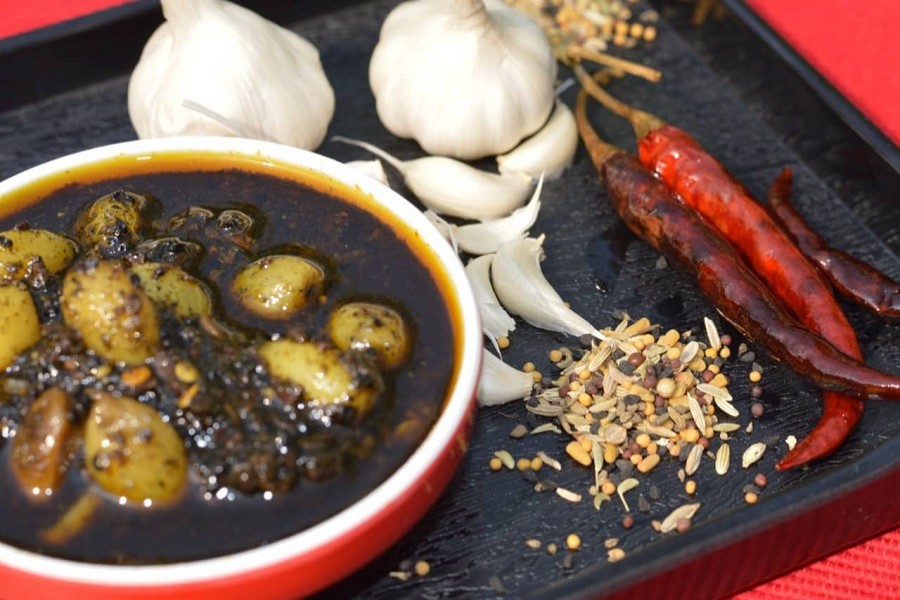
Published :
Updated :

It is summer, and almost everyone has a jar full of achar on their shelves. Achar is a staple with khichuri, daal and vegetable curries, and it also takes us back to our childhood, when our mothers used to make tasty achar with seasonal fruits.
Blessed are those who still can enjoy their mothers’ recipes, but for the ones who do not have the chance, branded achars are the last resort.
However, mass-manufactured achars do not have the authentic desi flavour, and here, we need to rely on the online shops that create custom, authentic achars.
The Financial Express has talked to one such entrepreneur, Lutfun Nahar Leena, the owner of the online achar shop ‘Leenas Achar’ and tried to find out about the tradition of achar and how she and other online achar providers are working to uphold the traditions.
The beginning
Leena began her tale of starting the business, “After leaving my job, I attempted a boutique, but it did not work out the way I wanted. Besides, I thought of starting something new after having my baby, something that will help me to get rid of the depression, tiredness, and hopelessness.”
So she started her business with the support of her friends, and their supportiveness fuelled her journey.1.jpg)
Leena started her business in 2016 when she sold achar worth fifteen hundred taka to her friends, which made her popular in the Jahangirnagar University Community, her alma mater. Since then, she has been delivering achar all over the country. Four other people work under her now and a few others are connected in various ways.
“Perhaps, you can call it my attempt to protect one of our cultural heritages,” she said, “and now I am learning the new ways of preservation, trying out new recipes, and helping other people’s employment."
Bit of interest in history
Preserved fruits and vegetables have been around for a few centuries. Pickled cucumbers were the first preserved vegetables, and they came from the Duth settlement in the United States. Later, carrots, onions, peppers and beans - all joined the list to be preserved by pickling.
Achar is a Farsi word, and according to the Indian historians, it originated from the Indian subcontinent. Achar has existed for a long time, but it became widespread during the Mughal period.
Mughals, the ever so dainty gastronome, introduced Aamsotto to the subcontinent, as they were avid mango eaters, and their cooks were always looking for new ways to preserve the mangos in off-seasons.
The Mughal era
Leena talked about the history and origin of achar in this land; according to her, there is a high chance that achar had its roots during the Charyapada era, as we can see the mention of tamarine in the Charyapada scripts.
This was further improved in the Sultani period, and later by Raja Man Singh, who brought the Mughal achars to Bengal.
“Achar and Aamshotto have been mentioned in our literature as well,” she added, “we find them in the works of Micheal Madhusudan, Rabindranath, and Nazrul.”
Bangladeshi achar has many similarities with Indian and Pakistani achar, as they share a common origin.
Promoting ‘Deshi’ flavour
However, Bangladeshi achar has a unique balanced flavour of sweet, spiciness and saltiness. Indian achars are mostly salty and citrous, while Pakistani achars are either too spicy or too sweet. The Sri Lankans put too much bombay pepper in their achar, so they are too spicy for our palate.
Achar has its place among the people of all sections, regardless of social status. In the rural areas, the women show their creativity and culinary skills by creating new achar recipes.1.jpg)
However, in the urban areas, making achar is a tough job, given the fast-paced life allows no breather and space for the women. They hardly find a chance to set aside time for lengthy processes of achar making. Besides, sunlight is essential for achar, and it is scarcer than gold in this city.
So, Leena thinks that these two factors make it hard for urban women to indulge in achar process.
“Here entrepreneurs like me come forward,” Leena affirms, “we try to fill in the gaps between the urban busy women and delicious achars.”
“We make achars in traditional ways, with the authentic desi flavour, and fulfil their achar cravings. That way, we try to preserve our rich tradition of achar and establish a successful online business as well.”
In her words, the traditional taste of achar is not going anywhere in the near future, as people are coming forward to start online achar shops, and they are making good business as well.
Leena is working on unique fusion recipes, and they have been lauded by the customers as well. Now, she is experimenting on creating her own recipes and finding new recipes from various rural regions of the country. Her goal is to promote all the unique and local achar recipes around the country.
Entrepreneurs who are using online businesses to promote such authentic desi flavours and recipes need patronage and support from the consumers to flourish.


 For all latest news, follow The Financial Express Google News channel.
For all latest news, follow The Financial Express Google News channel.